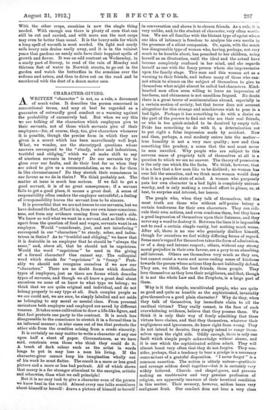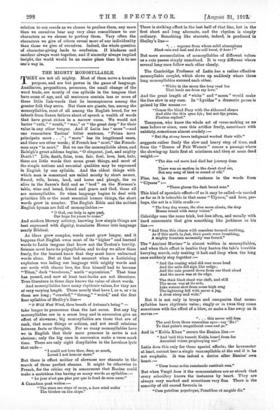CHARACTER-GIVING.
AWRITTEN "character " is not, as a rule, a document of much value. It describes the person concerned in conventional terms, and may at best be regarded as a guarantee of outwardly good conduct or a warning against the probability of excessively bad. But when we say this we are talking of the characters which employers give to their servants, not of those which servants give of their employers—for, of course, they, too, give characters whenever it is possible, though the precise form in which they are given is a secret which has been marvellously well kept. What, we wonder, are the stereotyped questions whose answers correspond to the " steady, sober and industrious, truthful and obliging," which we all make shift to say of nineteen servants in twenty ? Do our servants try to gloss over our faults, and do their best for us when they are asked to give us a recommendation, as we do for them in like circumstances ? Do they stretch their consciences in our favour as we do in theirs ? We think probably not. The matter at issue is much less serious. If we fail to get a good servant, it is of no great consequence ; if a servant fails to get a good place, it means a great deal. A sense of responsibility often renders the employer untruthful; a feeling of irresponsibility leaves the servant free to be sincere.
It is proverbial that we are not heroes to our servants, but we have deduced the fact, if fact it is, from our own inner conscious- ness, not from any evidence coming from the servant's side. We know so well what we want in a servant, and so little what, apart from the question of food and wages, servants want in an employer. Would "considerate, just, and not interfering " correspond in our " characters " to steady, sober, and indus- trious in theirs ? As to "truthful and obliging," we know that it is desirable in an employer that he should be "always the same," and, above all, that he should not be capricious. Would the word " capricious " be used in the giving of a formal character? One cannot say. The colloquial word which stands for "capricious" is "funny." Prob- ably we should not recognize ourselves if we saw our "characters." There are no doubt forms which describe types of employers, just as there are forms which describe types of servants, and though we all know a great deal about ourselves we none of us know to what type we belong; we think that we are quite original and individual, and do not belong properly to any type at alL Such complex people as we are could not, we are sure, be simply labelled and set aside as belonging to any moral or mental class. From personal caricature both employer and employed are saved by different reasons. It takes some cultivation to draw a life-like figure, and that fact protects one party to the contract. It is much less disagreeable to the conscience to stretch it in a formal than in an informal manner; in nine cases out of ten that protects the other side from the cruelties arising from a crude sincerity.
It is certainly no easy matter to write a character of any one upon half a sheet of paper. Circumstances, as we have said, constrain even those who think they could do it. A touch of dark colour such as the artist in words longs to put in may lose a man his living. If the character-giver cannot keep his imagination wholly out of his work he must flatter. The result is a more or less good picture and a more or less bad portrait. All of which shows that mercy is a far stronger stimulant to the energies, artistic and otherwise, than what we call principle!
But it is no easy task to give a character even of the person we know best in the world. Almost every one talks sometimes about himself or herself : draws a picture of himself or herself in conversation and shows it to chosen friends. As a rule, it is very unlike, and, to the student of character, very often worth- less. We are all familiar with the blatant type of egoist whose one idea of intimacy is freedom to analyse his own merits in the presence of a silent companion. Or, again, with the much less disagreeable type of woman who, having, perhaps, not very much to be humble about, has preached to her children, using herself as an illustration, until the ideal and the actual have become completely confused in her mind, and she regards herself as one with the fancy person whom she impersonates upon the family stage. This man and this woman act as a warning to their friends, and induce many of those who can- not attain to silence on the subject of themselves to give to themselves what might almost be called bad characters. Kind- hearted men often seem willing to leave an impression of hardness, and obtuseness is not unseldom feigned. No doubt there is a great terror of sentimentalism abroad, especially in a certain section of society, but that terror does not account altogether for this strange and mischievous wish to pose in a bad light. Perhaps it has something to do with a desire on the part of the poseurs to find out who are their real friends, or who is too quick-minded to be deceived by empty talk. Pride has something to do with it, a determination not to put right a false impression made by accident. Now and then, perhaps, a real modesty enters into the matter— true humility is not a very rare quality ; now and then something like prudery, a sense that the soul must never be seen unveiled. Why people who are subject to this nervous sense of propriety talk of themselves at all is a question to which we see no answer. The theory of possession is the only one which fits the facts. We think, however, that it is a fact that a few men like to be disliked ; no woman has ever felt the' sensation, and we think most women would deny that it is a possible state of mind. A woman who purposely puts her own character in a bad light is completely untrust- worthy, and is only making a crooked effort to please, or, at best, to surprise and interest, her hearer.
The people who, when they talk of themselves, tell the most truth are those who without self-praise betray a certain tenderness for their own characters. They can ridi- cule their own actions, and even condemn them, but they leave a good impression of themselves upon their listeners, and they never say a word to destroy it. Between the lines it is impossible not to read a certain simple vanity, but nothing much worse. After all, there is no one who genuinely dislikes himself, though for ourselves we feel widely differing forms of regard. Some men's regard for themselves takes the form of admiration, or of a deep and intense respect ; others, without any strong moral prejudice in their own favour, are a prey to an absorbing self-interest. Others see themselves very much as they are, but cannot resist a warm and never-ending sense of kindness towards the person whose actions they do not habitually defend. They are, we think, the best friends, these people. They love themselves as they love their neighbours, and that, though it is not the whole Law and the Prophets, is a large part of them.
Why is it that simple, uncultivated people, who are quite as good and quite as humble as the sophisticated, invariably give themselves a good plain character ? Why do they, when they talk of themselves, lay immediate claim to all the cardinal virtues ? They really cannot, in the face of such overwhelming evidence, believe that they possess them. We think it is only their way of freely admitting that these virtues have claims, and that they themselves, whatever their negligences and ignorances, do know right from wrong. They do not intend to deceive, they simply intend to range them- selves upon the right side. Oddly enough, there is only one fault which simple people acknowledge without shame, and it is one which the sophisticated seldom admit. They will almost boast very often that they do not forgive. They con- sider, perhaps, that a tendency to bear a grudge is a necessary concomitant of a grateful disposition. "I never forget" is a common assertion. The notion is utterly untrue—gratitude and revenge seldom dwell together—but it is certainly very widely believed. Church- and chapel-goers, and persons making an unobtrusive and -very genuine profession of
religion, are apparently unaware of their heretical condition in this matter. Their memory, however, seldom bears very malignant fruit. Our conduct does not bear a very close
relation to our creeds as we choose to profess them, any more than we ourselves bear any very close resemblance to our characters as we choose to portray them. Very often the characters we give of others reveal more of our individuality than those we give of ourselves. Indeed, the whole question of character-giving leads to confusion. If kindness and candour always went together, and if sincerity always implied insight, the world would be an easier place than it is to see one's way in.



































 Previous page
Previous page